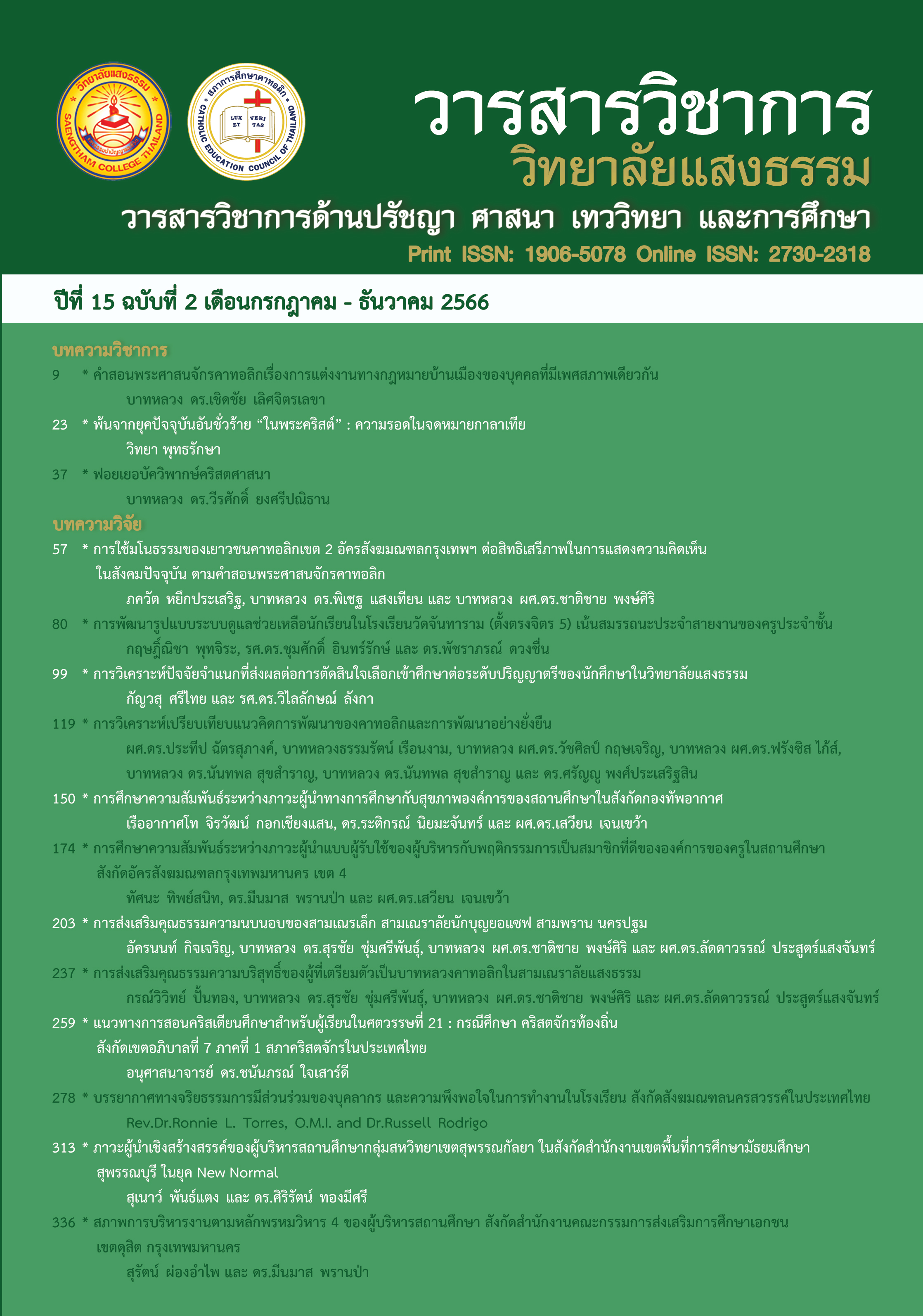Liberation from the Present Evil Age “In Christ”: Pauline Soteriology in the Epistle to the Galatians.
Main Article Content
Abstract
Generally, soteriology in the Epistle to the Galatians is mainly portrayed with juridical image. However, the group of biblical scholars who read Paul’s letters through apocalyptic perspective argues that he presents his soteriology in this letter with Jewish apocalyptic aspect as well. Throughout this letter, Paul also points out that salvation is the divine liberation from the evil powers and this liberation comes to humanity through our participation in Christ’s death and resurrection. Through our participation in Christ’s death, our old self was co-crucified with Christ and through our participation in Christ’s resurrection, we were raised to live our new life as the new creation. Moreover, Paul also points out that there is a transfer of believers from the present evil age to the new mode of existence “in Christ” which is the space where the evil powers are no longer a threat. In this new sphere of power, the believers will be ruled by divine power through the Holy Spirit. This apocalyptic soteriology is more appealing to Thais in their religious context, and it would be easier for them to accept and be relatable to the Gospel rather than the juridical soteriology.
Article Details

This work is licensed under a Creative Commons Attribution-NonCommercial-NoDerivatives 4.0 International License.
- The academic and research articles, as well as the content and opinions expressed therein, published in Saengtham College Journal are solely the responsibility of the respective author(s).
- Articles published in Saengtham College Journal are the property of Saengtham College. Reproduction, modification, or dissemination of all or part of the content in any form without written permission from Saengtham College is prohibited.
- Articles published in Saengtham College Journal are protected under the Copyright Act.
References
Beker, J. Christiaan. (1980). Paul the Apostle: The Triumph of God in Life and Thought. Fortress Press.
Betz, H. Dieter. (1979). Galatians: A Commentary on Paul’s Letter to the Churches in Galatia. Fortress Press.
Bultmann, Rudolf. (1965). Theology of the New Testament. Translated by Kendrick Grobel. SCM.
Collins, Adela Yarbro. (2014). Apocalypticism and Christian Origins. In John. J. Collins (Ed.), The Oxford Handbook of Apocalyptic Literature. (pp.327–339). Oxford University Press.
De Boer, Martinus. C. (2011). Galatians: A Commentary. Westminster John Knox Press.
Dunn, James. D. G. (1993). The Epistle to the Galatians. Hendrickson Publishers.
Dunn, James. D. G. (1998). The Theology of Paul the Apostle. Eerdmans.
Kasemann, Ermst. (1969). The Beginnings of Christian Theology. Translated by W. J. Montague, New Testament Questions of Today (pp.82–87). Fortress Press.
Longenecker, Richard. N. (1982). The Pedagogical Nature of the Law in Galatians 3:19-4:7. Journal of the Evangelical Theological Society, 25(1), 53–61.
Martyn, J. Louis. (1997a). Galatians: A New Translation with Introduction and Commentary (Vol. 33A). Doubleday.
Martyn, J. Louis. (1997b). Theological Issues in the Letters of Paul. Abingdon Press.
Oakes, Peter. (2015). Galatians. Baker Academic.
Sanders, Ed. P. (1977). Paul and Palestinian Judaism: A Comparison of Patterns of Religion. Fortress.
Sasse, Hermann. (1964). Αἰών, αἰώνιος,. In Gerhard Kittel, Geoffrey William Bromiley, Gerhard Friedrich, and Gerhard Delling (Eds.), Theological Dictionary of the New Testament (Vol.1, pp.197–208). Eerdmans.
Schweitzer, Albert. (1998). The Mysticism of Paul the Apostle. Translated by William Montgomery. Johns Hopkins University Press.


